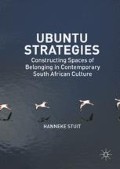Abstract
Stuit opens up an interpretation of ubuntu that counters its frequent use to refer to a “lost” common humanity in an idealized past that needs to be recovered as a predetermined future. Instead, Stuit proposes to think of ubuntu as a convergence of differing and historically contingent interests and pairs ubuntu with the assemblage (DeLanda), answerability (Bakhtin), and the future anterior (Spivak). The chapter further explores the ethical demands placed on the subject by the fact that human relations change constantly. The focus on contingency in the case studies of Gordimer’s None to Accompany Me and Coetzee’s Age of Iron locates a basis for responsible action in these conditions of uncertainty, which differs from the communal forms offered by familial, sexual, and historical relations.
Access this chapter
Tax calculation will be finalised at checkout
Purchases are for personal use only
Author information
Authors and Affiliations
Copyright information
© 2016 The Author(s)
About this chapter
Cite this chapter
Stuit, H. (2016). Ubuntu in Transit: From Divisive Pasts to Open Futures. In: Ubuntu Strategies. Palgrave Macmillan, New York. https://doi.org/10.1057/978-1-137-58009-2_3
Download citation
DOI: https://doi.org/10.1057/978-1-137-58009-2_3
Published:
Publisher Name: Palgrave Macmillan, New York
Print ISBN: 978-1-137-58639-1
Online ISBN: 978-1-137-58009-2
eBook Packages: Literature, Cultural and Media StudiesLiterature, Cultural and Media Studies (R0)

